- Home
- Blake Crouch
Locked Doors Page 2
Locked Doors Read online
Page 2
“Oh no you won’t.”
Jenna’s head disappeared and Beth climbed back up onto the pier, smiling as she scanned the water.
“I see you!” she yelled though she couldn’t. “I see—”
Wet arms wrapped around her own and Beth screamed.
“Got you,” John David said. “You’re going in.”
“No, J.D.,” Beth pleaded as he muscled her toward the edge. Though only a prepubescent boy of eleven he was strong and quick. “I’m your mother and I am telling you that if you push me into that water I’ll ground you forever. Is it worth it?”
John David sighed and let go.
Beth stepped away from the edge and faced her son, thinking, You’ll be taller than me in two years.
Beads of water glistened on his hairless littleboy chest.
“Now I want to tell you something,” she said with convincing parental sternness. “You listening to me?”
“Yes ma’am.”
His voice was still high, at least a year from turning.
“I want to tell you…this!”
Beth shoved him off the pier and he screamed as he hit the water. She laughed, raised her hands in victory, and shouted, “Never underestimate the Mom!”
As John David bemoaned the injustice Jenna jerked him underwater by his ankles. The ripples made by the jet ski had begun to lap against the beams of the pier.
“I’m going in!” Beth yelled. “Don’t stay out long!”
“Come on, Mom, it’s Friday night!”
Walking back up the pier, she acknowledged this interval of peace—her children had touched her; what else mattered?
When she reached the cool grass she glanced back at her kids, then on across the lake at the quarter mile of shoreline where the monster used to live.
She’d received a letter from Andrew Thomas after Walter’s car turned up in Vermont.
As she walked into the house to fix herself a drink and look through her wedding album, the words of that thing echoed in her head:
Dear Beth,
Before I begin, please know that I did not murder my mother. And don’t believe what you read in the papers. I say this only to qualify what I have to tell you about your husband. Walter is dead, Beth, and it’s my fault, and I am so, so sorry. I want you to know that he died protecting you and Jenna and John David, and he did not suffer. Also know that because of his efforts, you and the children are safe. He’s buried in a secluded grove of pines in the Vermont countryside. I wish I could personally deliver this news to you but I have to disappear now. I hope you understand. I’m not an evil person, Beth. I tried to make the right choices. I’m going to keep on trying to make the right choices. But evil is alive and well in the world. And sometimes all we can do is not enough.
Andy
3
MY name is Andrew Thomas and I live in a world that believes I am a monster.
Once upon a time I was a suspense novelist. I had money. I lived in a beautiful house on a lake in North Carolina. I had friends. Lovers. I knew what respect and a mite of celebrity felt like.
Then someone came along and destroyed all of it.
His name was Orson Thomas and he was my fraternal twin.
Under threat of blackmail he took me to a remote cabin in the high desert of Wyoming.
He was a psychopath.
He showed me a side of myself I will spend the rest of my life annulling.
But the horror of what happened in that desert is another story.
In the end I escaped.
My brother was killed. His accomplice—a soulless individual named Luther Kite—I shot and left for dead, tied to a chair on the front porch of Orson’s cabin in the vast and snowswept desert.
That was November 1996 and I faced returning to a world that feared and hated me.
Bodies had been unearthed at my home on Lake Norman.
I was suspected in my mother’s death.
I was suspected in Walter Lancing’s disappearance.
I was the writer turned serial killer.
Orson and Luther had framed me in every way imaginable.
I couldn’t go home.
I was wanted.
And though I’d done questionable things in the name of self-preservation, I was by no means a murderer.
So I ran.
The village of Haines Junction, Yukon saved my life.
I’d been running two years when I found it—through desert villages in northern Mexico, the Baja Peninsula, the towns and cities of America.
I worked a summer in a lumber yard in Macon, Georgia.
I was a busboy for one week in Baltimore.
A ranch hand for a west Texas winter.
I slept in tents.
Homeless shelters.
Bunkhouses.
Fields beneath stars on cool clear nights.
I grew my hair out.
I didn’t shave.
I didn’t bathe.
I left places.
Arrived at new places.
I stopped reading.
Stopped writing.
I fulfilled my alcoholic tendencies.
I traveled by bus.
Hitchhiked.
Jumped a train once through South Dakota.
I never talked to anyone.
Because my name had become synonymous with murder and matricide I lived in constant fear, suspected everyone.
At a construction site in London, Kentucky, the foreman asked if I liked to read thrillers. Maybe he was just being friendly. I wasn’t there the next day to find out.
My face appeared on FBI posters.
I was the subject of television specials.
Books were written about me.
My novels sold like crazy.
People wanted to know how a serial murderer writes.
They said my stories were windows into an evil soul.
I became notorious.
A darkly comic figure of pop culture.
My name instilled fear.
My name was a punch line.
My name meant murder.
Having never been married, I was accustomed to living alone, but I’d not experienced this grade of utter abandonment.
I was homeless, hunted, and lonely.
It was no way to live.
In December, two nomadic years after my escape from the snowbound Wyoming desert, I took a bus to Vancouver, bought a plane ticket, and flew to Whitehorse, Yukon, a thousand miles north.
I rented a car and drove the Alaska Highway one hundred fifty kilometers west to the village of Haines Junction at the foot of the St. Elias Mountains. I’d researched the village for a book I never wrote. It seemed like a quiet isolated place to die.
I pulled off the highway outside of town, a vast coniferous forest extending in every direction, great white mountains looming in the west. The temperature held at minus thirty. The sky was gray, dusky, the subarctic sun a halfhearted presence over the distant peaks. The dashboard clock read 1:47 p.m. I would simply walk into the woods, sit down against a tree, and freeze to death. It seemed a peaceful way to go. Vaguely romantic. I thought of Jack London’s “To Build a Fire.” I looked forward to that warm euphoric stillness that would come near the end.
Wearing only a T-shirt, I opened the door and stepped out of the car into crusty snow. The cold was beyond comprehension. My eyes burned.
I walked a ways into the woods, chose a leafless aspen, and sat down with my back against the silver bark. I waited. I began to shiver. My stomach rumbled. I thought, Why die hungry? I got up, walked back to the car, and drove into the village, home to eight hundred residents though far fewer in these bleak winter months. I parked downtown in front of a diner called Bill’s, the street decorated for Christmas. I reached to open the car door but stopped.
I put my head on the steering wheel.
Wept.
But those dark times rarely haunted me. I’d lived in the woods outside of Haines Junction now for five years and it was sweet a
nd essential to be this other man.
To the community my name was Vincent Carmichael and I’d become a full-fledged resident. The townsfolk might’ve described me as quiet but friendly. I was the American with long brown hair and an untamed beard. Everyone’s acquaintance. No one’s friend. But that was okay here. People came to this remote northwest corner of Canada to escape things. Haines Junction was a lodestone for damaged people.
During the tourist season, I worked as a chef in the kitchen of The Lantern, one of two fine-dining establishments in the village. There I earned enough money to live through the winter months, October to April, when there was no work and little to do but stay indoors near a fire.
I spent half my savings on a cabin. Six miles west of town in a valley called the Shakwak Trench, it stood in a grove of spruce, lost in the endless forest. From the window above my kitchen sink, a small meadow could be seen forty yards through the firs—a distant patch of green light when the sun was strong. Lying in its grass, you could see into the Kluane Reserve and the front wall of the ice-laden St. Elias Mountains that rose from this forest just a few miles to the west. There was even a pond a quarter mile south. I swam in it during the fleeting warmth of summer.
I’d always cherished my solitude but never more than now, sitting alone in a rocking chair on my front porch this cold Friday evening.
Stars shone through the crowns of the trees.
The constellations were sharp.
There are no cities in the Yukon to muddy the sky with manmade light.
As I rocked, my hands shoved deep into the pockets of my down vest, I closed my eyes, resisting one of those twinges of surreal nostalgia that make you acutely aware of all the living you’ve done and how the choices you’ve made have led to this moment of introspection. I was forty-one years old, and I couldn’t begin to stomach the totality of my life—too checkered, too sprawling. So I tried to live safely and habitually, moment to moment.
It passed, those lethal thoughts of Walter, my mother, and the things I did in Orson’s desert now receding back into the prisons I’d built for them.
Though I had supper to make and words to write, I opted for an evening stroll. Rising, I pulled my hair into a ponytail and stepped down off the porch. I followed a deer run through the spruce grove, the air glutted with the spicy scent of sap, branches brushing against my vest, twigs snapping under my boots.
It was late October—ice rimmed the pond and autumn waned, the arc of the sun diminishing noticeably each day. Even the aspens had shed the last of their heartshaped leaves. Only the spruce held color, an ashy bluegreen, some stunted and withered from the harsh winters, others full and majestic despite existing a mere four hundred miles south of the Arctic Circle.
I reached the meadow. Above the trees on the far side, the first peaks of the St. Elias Range towered in the west, hulking and austere, their snowpack blue beneath the stars. These mountains stretched on for a hundred fifty miles through the southeast leg of Alaska, west to the Pacific. They contained Canada’s highest mountain and the largest non-polar icefield in the world, a hundred mile river of ice that crept down from the slopes of the Icefield Ranges into the sea.
But the mountains are nothing but cold boring piles of shattered rock when the sky is blazing with the aurora borealis. I gazed up into the cosmos and felt it move me. It always moved me.
As a southerner who’d only glimpsed the northern lights in photographs, I’d thought of this lucent phenomenon as a still life fixture in the sky. But tonight it was a flickering ribbon that appeared to spring from a point of origin just beyond the mountains. It rose and curved sharply, a green mane running parallel to the horizon—a shock of glowing ions forty miles above the earth. It seemed an ethereal symphony should accompany this skyfire but the night maintained its massive silence.
Breathing deeply and contentedly, I laid down in the grass, and staring into that burning sky, filled once more with the rapture of knowing I was home.
4
HORACE Boone left his trailer in the village of Haines Junction after dark and followed the one-lane dirt road that passed by Andrew Thomas’s mailbox en route to the trailheads of the St. Elias Range. He pulled off the road a quarter mile from Andrew’s long winding driveway and parked his old Land Cruiser out of sight in the woods.
It was a ten minute jog through evergreens to the cabin.
The scrawny young man ran it easily in the dark, slowing to a careful walk when he glimpsed the glowing windows in the distance.
Stealing up to a window on the side of the cabin, he peered in, heart beating wildly. This was only the second time he’d come and by far the most exhilarating thing he’d ever done on a Friday night.
The monster stood at the sink washing his supper dishes, the walls of the cabin flushed with firelight. He wore black fleece pants, chili pepper-print fleece socks, and a long johns top. His hair fell in a matted tangle halfway down his back.
A book lay open on the small table behind Andrew. He’d apparently eaten his supper while reading by lanternlight.
When he’d dried and put away the last of the dishes, Andrew added wood to the fire, stoked it into a steady blaze, and climbed the ladder up into a loft.
From his cold perspective the voyeur could just make out the furnishings of Andrew’s writing nook—a desk, bookshelves, a typewriter, and little notes (perhaps two dozen of them) affixed to the rafters overhead. A poster of Edgar Allen Poe was also tacked to one of the beams. It fluttered in updrafts from the hearth.
Andrew sat at the desk and then faintly through the glass came the patter of his fingers on the keys.
The master was writing.
Horace grinned, mind racing to process every detail. They would be so important.
This time a year ago he’d just quit the University of Alaska’s MFA creative writing program. The meltdown had occurred during a meeting with his faculty advisor, the thirty-something Professor Byron, just a cocky toddler for the academic world. Horace had decided that his thesis was going to be a collection of short stories, all horror, and when he told this to Byron, the professor laughed out loud.
“What?” Horace said.
“Nothing, it’s just…I mean if you think you’re going to make a name for—”
“I’m sick of writing whiny, my-life-sucks fiction set in suburban kitchens.”
“You think that’s what we teach here?”
“I mean, God forbid a story actually have a fucking plot.”
“Mr. Boone—”
“You know I tried to read your book, um, what was it called, Fighting the Senses.”
Byron stiffened, straightened his glasses.
“Booooooooring. That isn’t what I want to write.”
The professor smiled, pure acid, said, “You know who didn’t think it was boring?” and pointed to a cutout of his glowing New York Times review taped prominently to the wall beside a bookshelf. “Now here’s the deal, Mr. Boone. I do not accept your thesis proposal. Come back in a week with a real idea or I’ll bounce your ass. You won’t return for spring semester. Good day.” And with that Byron had turned around in his swivel chair and begun typing an email.
So as instructed Horace returned the following week with a new thesis proposal: a comic book. The villain was a pretentious fucking ass named Byron and his superpower was the keen ability to eradicate the joy of writing from starry-eyed students. Horace was the hero, his superpower was quitting, and he stormed out of the office brimming with self-righteous indignation.
He found a job after Thanksgiving as a bookseller at Murder One Books near the campus, spent days helping customers find the perfect mystery, nights trying to produce his own collection of short horror fiction. After two weeks he’d started twenty stories and abandoned them all. By January he’d quit writing altogether, lost the energy and excitement of creation. Those winter months in Anchorage, he sank through frustration, depression, and settled comfortably into apathy. Fuck writing, reading. He lived for the sm
all pockets of pleasure—a case of Rolling Rock, reality TV, and sleeping. His dream of becoming a writer bowed out with hardly a whimper and he never missed it until one life-changing day.
Shivering, watching the shadows play on Andrew Thomas’s back, he thought of the cold and sunny April afternoon six months prior, when the most infamous suspense novelist in the world had strolled into his Anchorage bookstore and given direction to his life.
Having watched the customer browse the bookshelves for the last forty minutes, I know irrefutably that this is the writer and murderer, Andrew Thomas, regardless of his thick beard and long shaggy hair. It’s the piercing eyes and soft mouth that give him away.
At last he approaches the counter. He looks as I would expect—wary, cold, a man who has seen and done things that most people could not contemplate. My palms sweat, mouth so dry my sandpaper tongue feels leathery and feline.
He sets five hardbacks on the counter. We are alone in this tiny bookstore of new and old mysteries, only marginally larger than a dorm room. It is dim inside the store. The floor and shelves consist of dark knotty wood. There are no windows but this is no shortcoming. Every book is a window.
“Is this all, sir?” I manage.
He nods and my hands tremble as I begin to scan his selections: a used collection of Poe’s short stories, Kafka, three mysteries from one of his contemporaries.
I listen to the rhythm of his breathing—deep comfortable inhalations. I smell the tannin of his leather jacket. His eyes roam over my head to the shelf behind the counter that displays the ten bestsellers of Murder One Books.
“One-oh-three ninety-eight,” I say.
He points to the credit card that he’s already placed on the counter. I lift it, almost too urgently, and glance at the name welted upon the plastic: Vincent Carmichael.
I look up from the credit card into his eyes.
He’s staring at me.
I swipe the card, hand it back to him.
Tearing the receipt from the scanner, I lay it down on the counter with a pen and watch him sign Vincent Carmichael in wispy characters that are nothing like his true autograph.

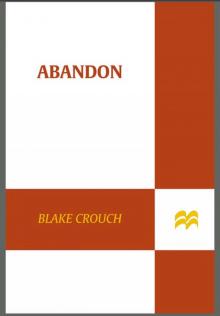 Abandon
Abandon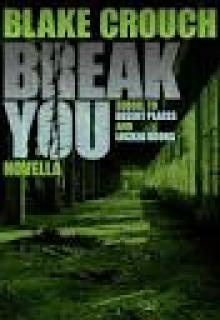 Break You
Break You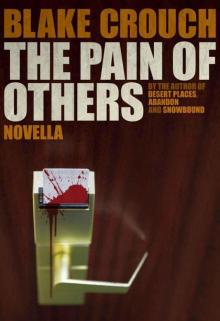 The Pain of Others
The Pain of Others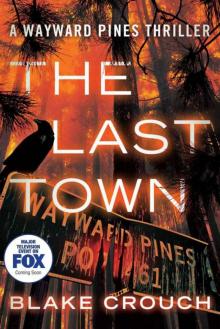 The Last Town
The Last Town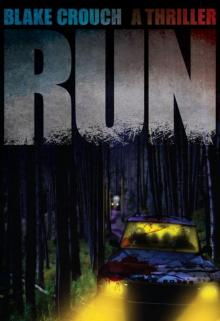 Run
Run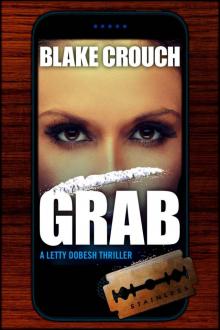 Grab
Grab Four Live Rounds
Four Live Rounds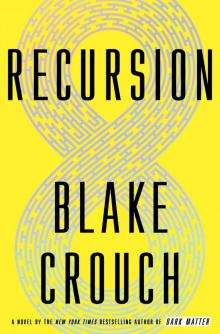 Recursion
Recursion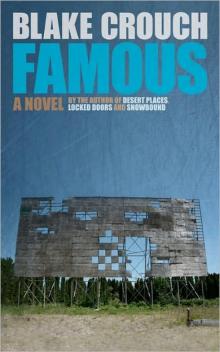 LUMINOUS BLUE: A Novel of Warped Celebrity
LUMINOUS BLUE: A Novel of Warped Celebrity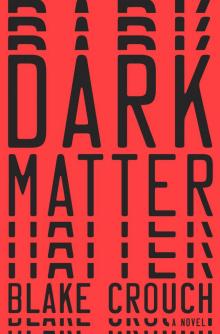 Dark Matter
Dark Matter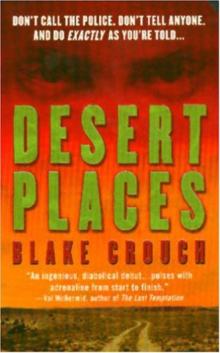 Desert Places
Desert Places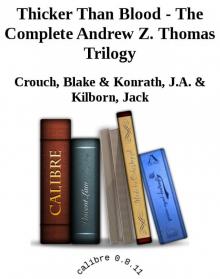 Thicker Than Blood - the Complete Andrew Z. Thomas Series
Thicker Than Blood - the Complete Andrew Z. Thomas Series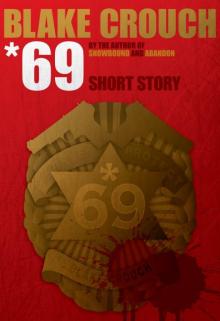 *69
*69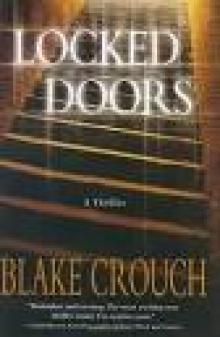 Locked Doors
Locked Doors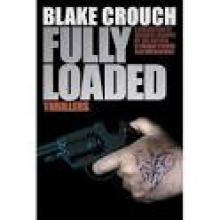 Fully Loaded Thrillers
Fully Loaded Thrillers![Summer Frost [Forward Collection] Read online](http://i1.bookreadfree.com/02/summer_frost_forward_collection_preview.jpg) Summer Frost [Forward Collection]
Summer Frost [Forward Collection]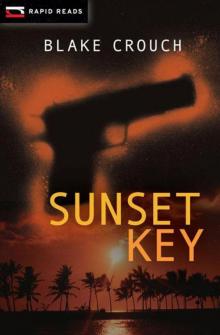 Sunset Key
Sunset Key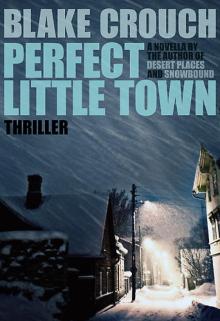 Perfect Little Town
Perfect Little Town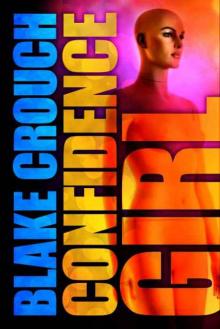 Confidence Girl
Confidence Girl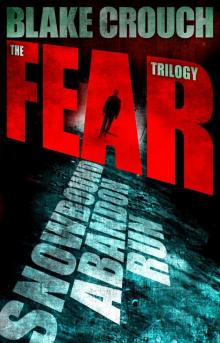 The Fear Trilogy
The Fear Trilogy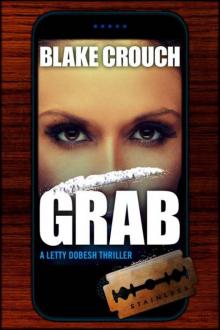 Grab ldm-3
Grab ldm-3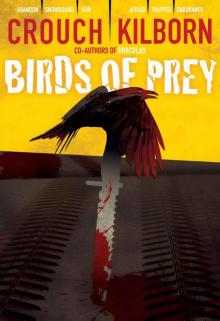 BIRDS OF PREY - A Psycho Thriller
BIRDS OF PREY - A Psycho Thriller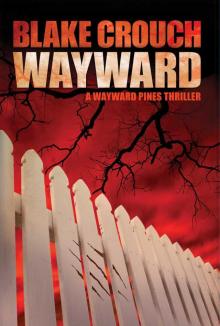 Wayward (The Wayward Pines Series, Book Two)
Wayward (The Wayward Pines Series, Book Two)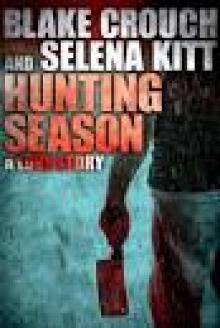 Hunting Season: A Love Story
Hunting Season: A Love Story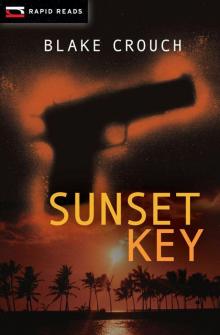 Sunset Key (Rapid Reads)
Sunset Key (Rapid Reads)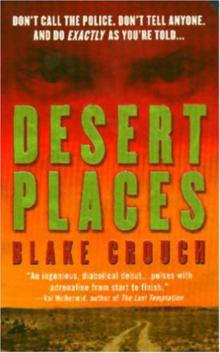 Desert Places: a Novel of Terror
Desert Places: a Novel of Terror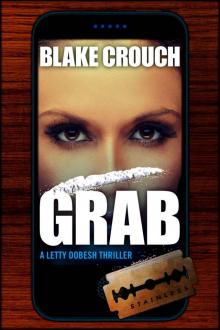 Grab (Letty Dobesh #3)
Grab (Letty Dobesh #3)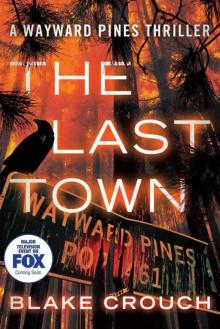 The Last Town (The Wayward Pines Trilogy 3)
The Last Town (The Wayward Pines Trilogy 3)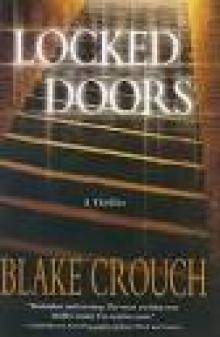 LOCKED DOORS: A Novel of Terror (Andrew Z. Thomas Thriller)
LOCKED DOORS: A Novel of Terror (Andrew Z. Thomas Thriller) BREAK YOU: A Novella of Terror (Prequel to Stirred) (Andrew Z. Thomas/Luther Kite)
BREAK YOU: A Novella of Terror (Prequel to Stirred) (Andrew Z. Thomas/Luther Kite)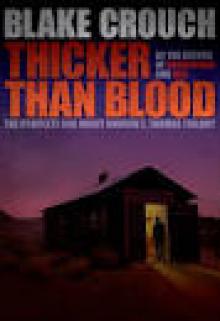 Thicker Than Blood - The Complete Andrew Z. Thomas Trilogy
Thicker Than Blood - The Complete Andrew Z. Thomas Trilogy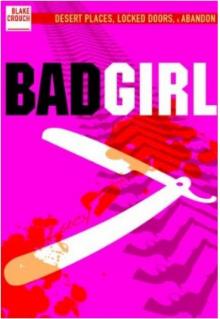 Bad Girl
Bad Girl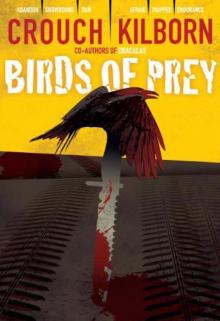 Birds of Prey
Birds of Prey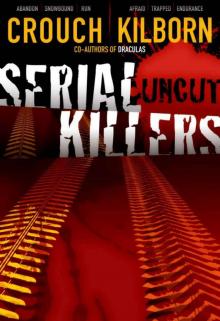 SERIAL KILLERS UNCUT - The Complete Psycho Thriller (The Complete Epic)
SERIAL KILLERS UNCUT - The Complete Psycho Thriller (The Complete Epic)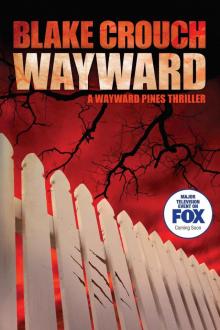 Wayward (The Wayward Pines Trilogy, Book 2)
Wayward (The Wayward Pines Trilogy, Book 2)